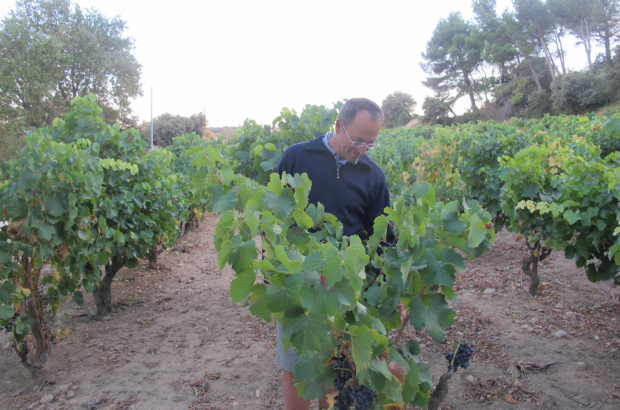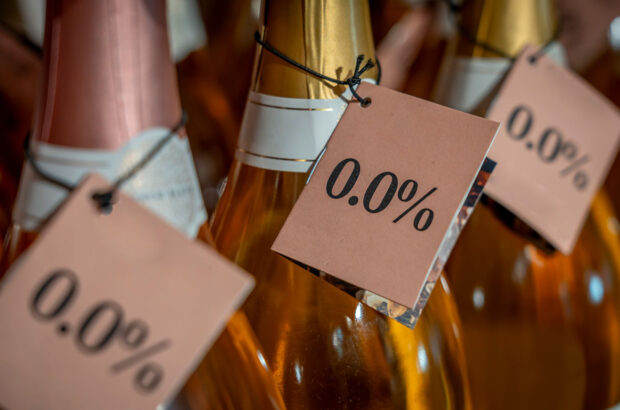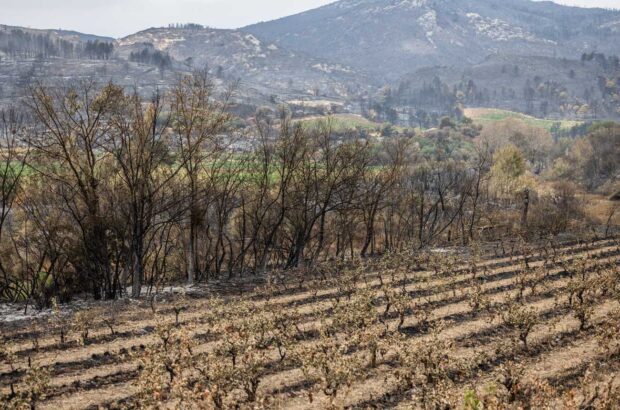Irrational fears aside, bees are an important part of any ecosystem, including vineyards. I spoke to beekeepers and vineyard owners to find out why.
‘There isn’t a direct link between the vine and the bee,’ says Victorine Fraisse of Domaine de Villeneuve in Pic St-Loup, north of Montpellier in Languedoc. Her father has been a beekeeper since 1989 and the estate has about 1,000 bee hives. In fact, Vitis vinifera vines are self pollinating, their flowers bearing both male and female reproductive parts.
The importance of bees, then, lies in their contribution to the biodiversity of the vineyard ecosystem. They pollinate cover crops, such as mustard or radish, which are often planted between vine rows, as well as the flora that surrounds biodiverse vineyards. Cover crops can prevent soil erosion, help with water absorption and drainage, and contribute to what is often called a living soil.
What’s more, ‘bees also attract other pollinators, such as butterflies and bumblebees’, says Jean-Pierre Torrontelle, a beekeeper based in Cruzy, near St-Chinian, west of Béziers, as well as other insects, such as wasps, which will often feed on harmful grapevine pests.
Bee protective
‘Bees are a visual balance of biodiversity,’ says Marlène Angelloz of producer Chêne Bleu in Ventoux, in the southeast of the Rhône valley. ‘If there’s a problem with insufficient flowers or with adverse weather, naturally bees will leave and install themselves elsewhere.’
A changing climate poses problems for bees. Extreme, unpredictable weather patterns affect the growth and flowering cycles of the plants upon which bees rely, and this reduces their food sources at certain times of year, Torrontelle explains. The Asian hornet, which has colonised continental Europe and has arrived in the UK, is a big threat, too, as it eats bees, potentially decimating hives.
A number of certification schemes, such as Bee Friendly, aim to protect endangered bee populations by recognising practices such as avoiding the use of chemical insecticides and pesticides, among others. Bordeaux’s St-Emilion appellation has embraced the label. In fact, in 2023, INAO – the organisation in charge of France’s agricultural sector appellations – approved a request to oblige St-Emilion, St-Emilion Grand Cru and Puisseguin St-Emilion to have at least two environment certifications, for which the Bee Friendly label is accepted.
Look out for…
In addition to those mentioned, look out for wines from the following wineries, which all have a particular focus on bees: Château Maris, Domaine de Cambis in Languedoc; Mas des Infermières in Luberon, Château Galoupet in Provence; Carpineto in Tuscany; and Grgich Hills Estate in Napa Valley, California.
Sip to make a difference
Chêne Bleu, Astralabe Blanc, Ventoux, Rhône, France 2024
Score 92
I love the flare of warm citrus that erupts from this blend of Roussanne, Grenache Blanc, Rolle and Clairette. It’s intensely zesty but also softly floral, with seductive notes of honeysuckle and blossom, while the finish is stony and mineral. Certified organic and bee friendly, too. Drink 2025-2028 Alc 13.5%

Mas des Infermières, Jack, Luberon, Southeast France 2023
Score 90
Acclaimed film director Sir Ridley Scott, owner of Mas des Infirmières, happens to love dogs, and this wine is named after one of his canine friends. A blend of Grenache, Syrah and Cabernet Sauvignon it’s big on juicy fruit, with a whoosh of pure strawberry and blackberry, succulent acidity and a light grip of tannin. Deliciously gourmand, and also certified bee friendly. Drink 2025-2027 Alc 14%








